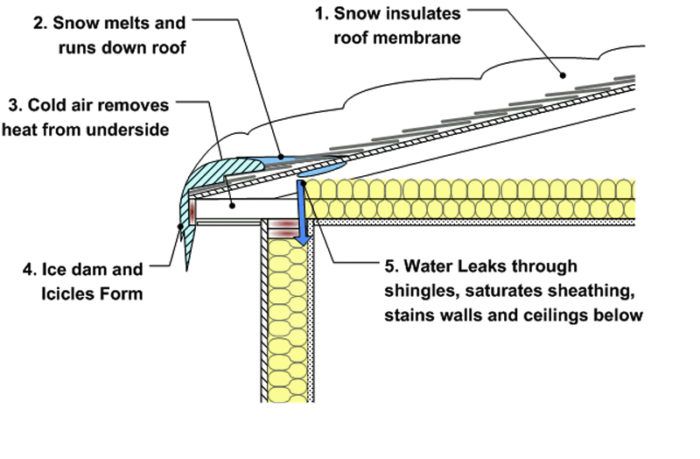Ice Dam Roof Insulation

Ice dams may result in leaks through the roofing material possibly resulting in damaged ceilings walls roof structure and insulation damage or injury when the ice dam falls off or from attempts to remove ice dams.
Ice dam roof insulation. This scenario is often the result of a warm attic. Ice dams and icicles form when the snow melts runs down your roof and refreezes near the edge. While some warm spots on the roof occur because of sunlight most are caused by heat escaping from the heated portions of the house. Another highly undesirable consequence is wet attic insulation which will likely loose its r value and cause serious mold issues.
Since heat transfer through the roof is the main cause of ice dams insulating the attic with foam insulation can help prevent ice dams by reducing the amount of heat transferred through the roof. If the ice dam breaks free it can pull shingles and gutters off with it and it will damage anything it falls on. New construction practices should follow or exceed the state code requirements for ceiling and roof insulation levels to prevent ice dams. Ice dams can be a real problem in winter.
Shrubs windowsills cars pets and people. Ice dams develop as snow on the upper part of the roof melts. This only occurs when part of your roof warms to above 32 degrees f warm enough to melt the snow while the roof edge remains below freezing. The snow layer traps warm beneath the snow which causes it to melt.
Eventually it will drip into the insulation and down into the ceilings and exterior walls beneath the eave ruining sheetrock and paint. There should not be any air leakage from the house into the attic space. In the tutorial it also describes some of the preventative things you can do before winter including. Ice dams usually start or worsen after a heavy snow because of snow s insulating properties.
In fact while it is normal for warmer air to circulate in the attic it should be exhausted through vents located near the ridge. Ice dams can form when as little as 1 or 2 inches of snow accumulates on a roof if the roof is poorly insulated and air sealed and the snowfall is followed by several days of sub freezing temperatures. Air temperatures well below freezing. The best way to prevent ice dams is to ensure that the air in the attic or against the bottom of the roof deck doesn t get too warm.
The tutorial how to prevent and remove ice dams describes what ice dams are and how you can try to prevent them from forming and damaging your home. Problems with an ice dam roof can vary greatly. Ice dam prevention is best achieved in three ways.
















































